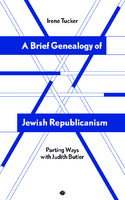A Brief Genealogy of Jewish Republicanism: Parting Ways with Judith Butler
Editorial: Punctum Books
Licencia: Creative Commons (by-nc-sa)
Autor(es): Tucker, Irene
A Brief Genealogy of Jewish Republicanism: Parting Ways with Judith Butler uses the chance synchronicity of the 2013 Israeli parliamentary elections and literary theorist Judith Butler’s controversial Brooklyn College address calling for the boycotting of Israeli academic, cultural, and economic institutions as an occasion for examining possible relations between Jewishness and state-centered forms of self-governance. In an extended analysis of Butler’s Parting Ways: Jewishness and the Critique of Zionism, Tucker shows how the alignment of certain authors’ identities and ideas undergirding Butler’s analytical framework draws upon a pointedly Christian conception of belief. This Christian conception of belief structures the most familiar understandings of modern secularism, articulated most famously by John Locke in his “Letter Concerning Toleration.” Tucker reads Locke’s “Letter”’ alongside Jewish philosopher/rabbi Moses Mendelssohn’s 1783 critique of Locke, Jerusalem: Or On Religious Power and Judaism, and the Jewish tradition of the minyan, making a case for the existence of an alternative history of publicness borrowing from Jewish conceptions of communal life and the proper relations of actions and ideas. In throwing light on a genealogy of Jewish practices aimed at the deliberate creation of collectives constituted by their grappling with contingent, historical time, Tucker argues for the existence of a Jewish tradition of republicanism, of democracy. Within such a context, the Jewishness of Israel can be seen to lie first and foremost in its methods of generating a civil collective out of a diverse citizenry rather than in the identities of its individual citizens.
Compartir:
Una vez que el usuario haya visto al menos un documento, este fragmento será visible.


